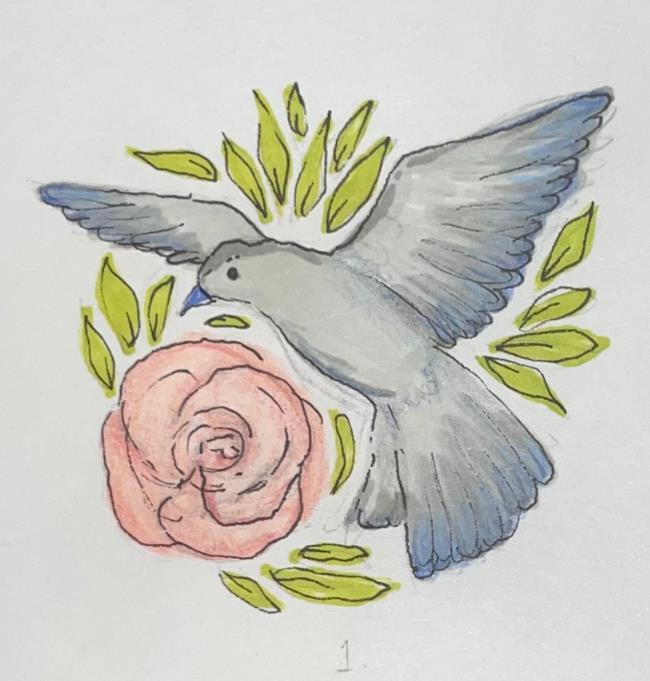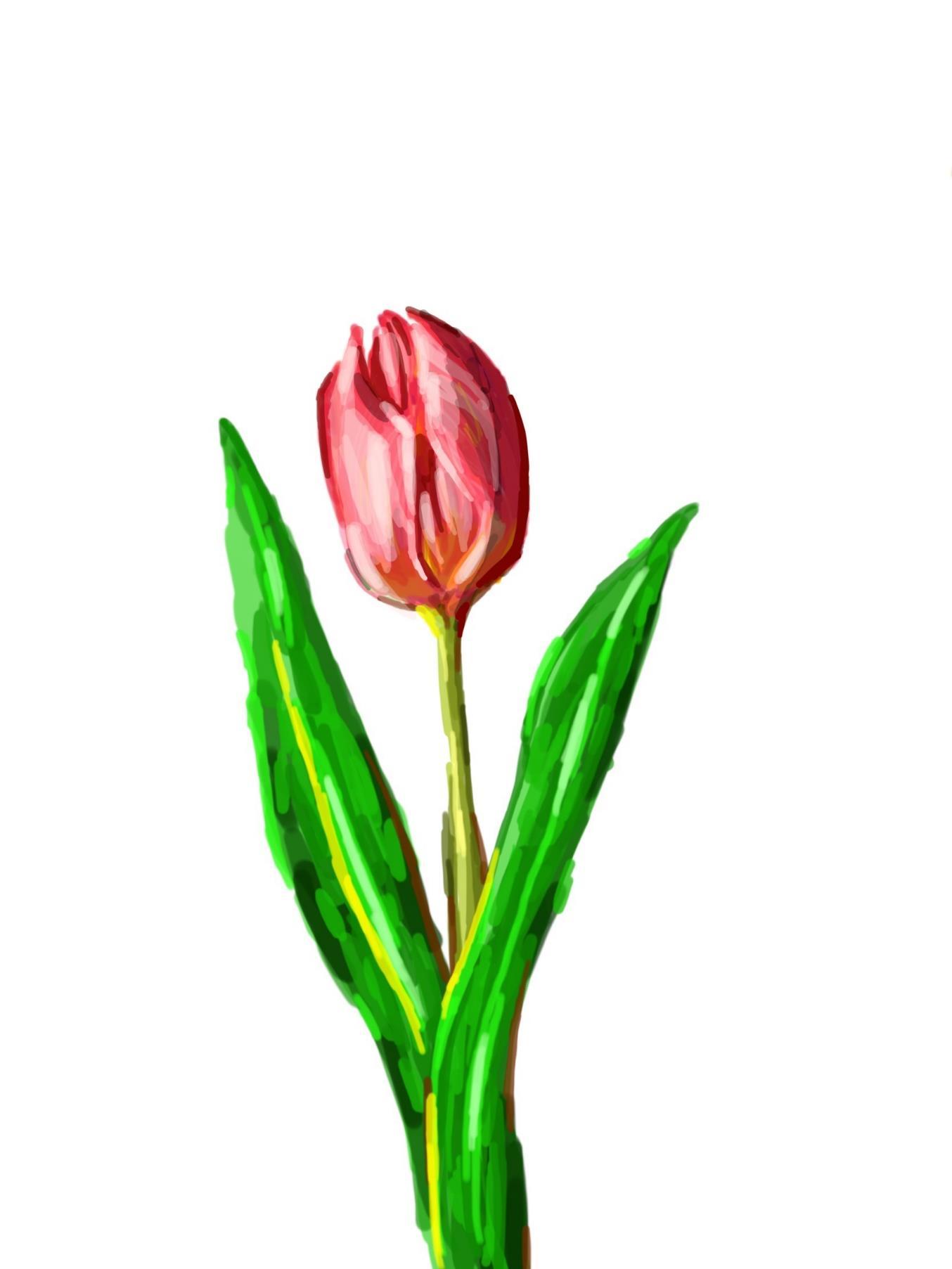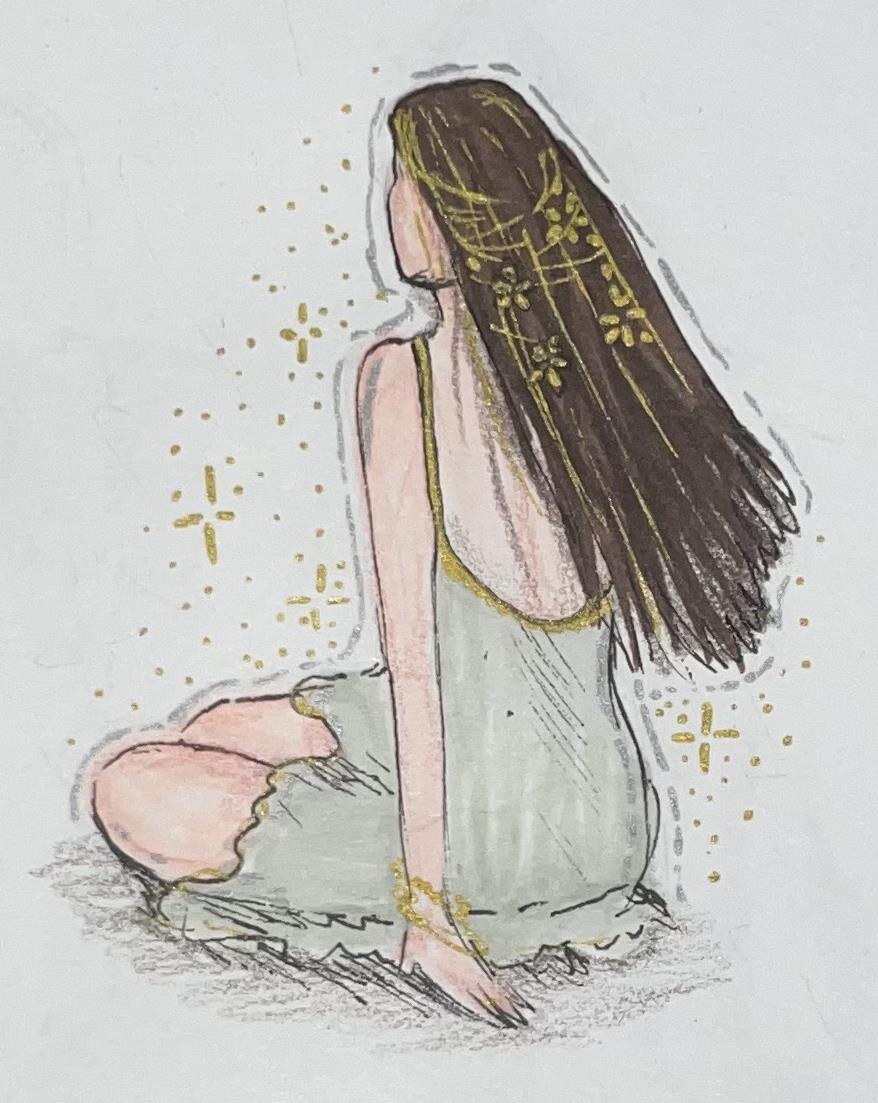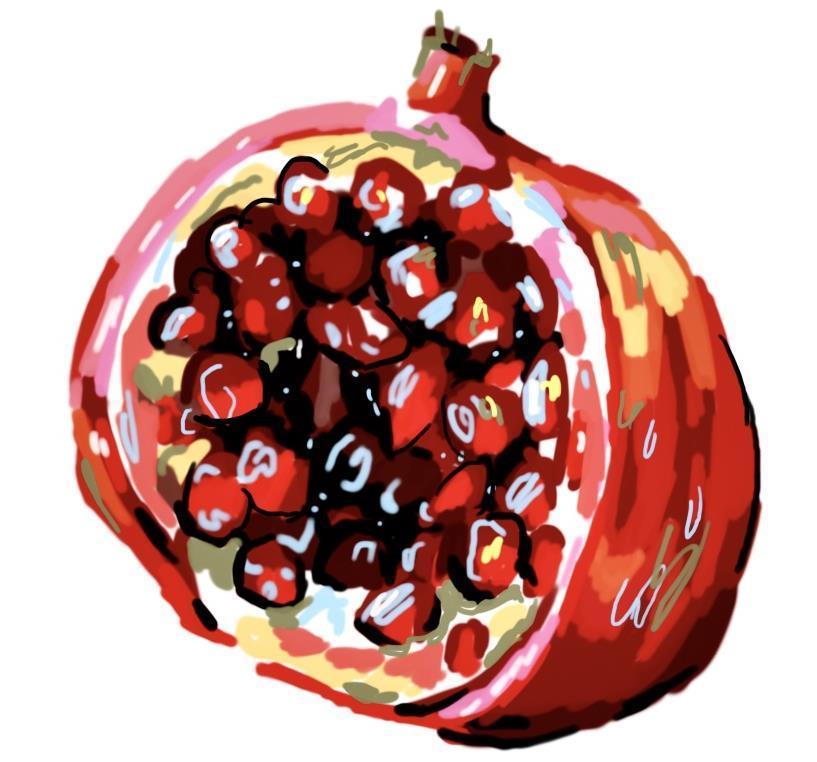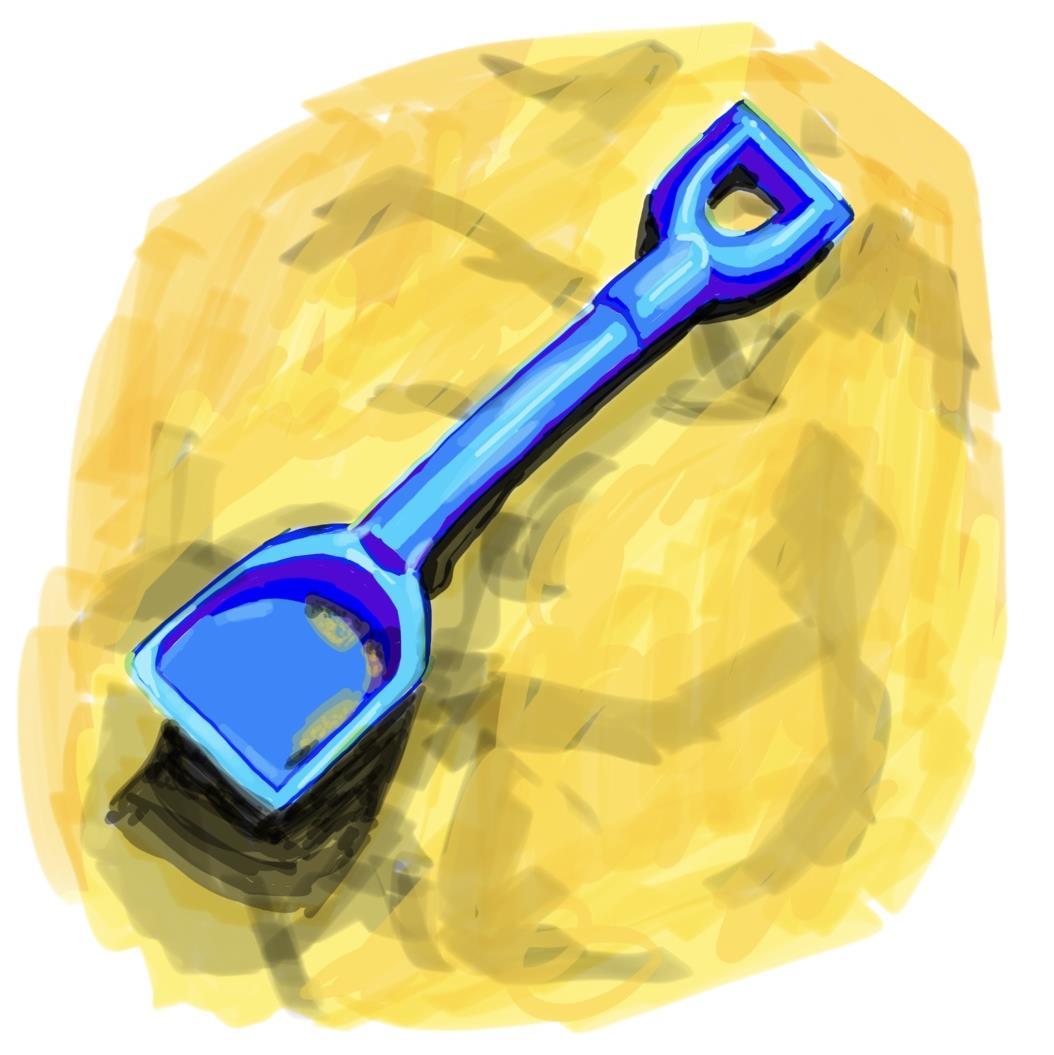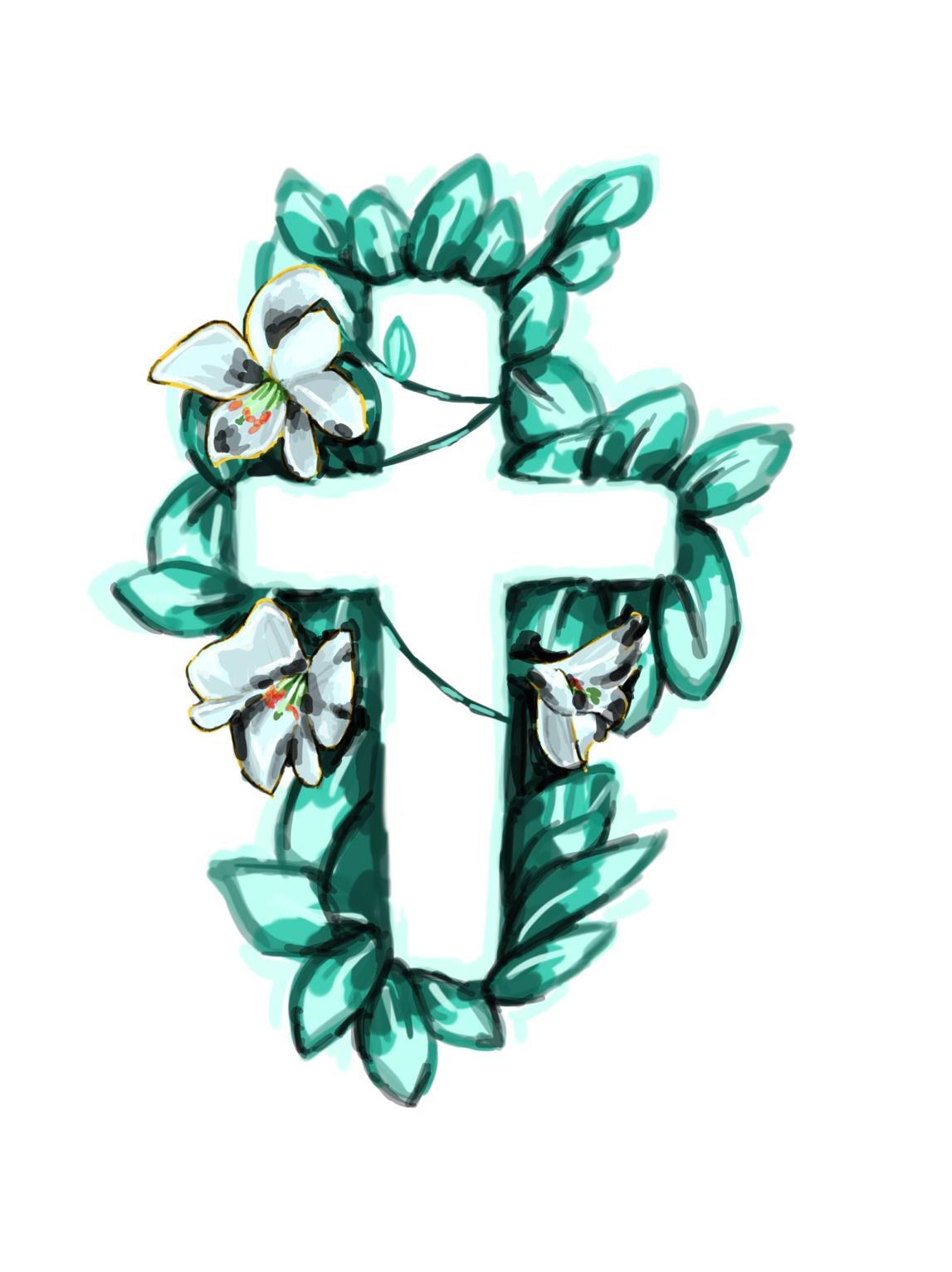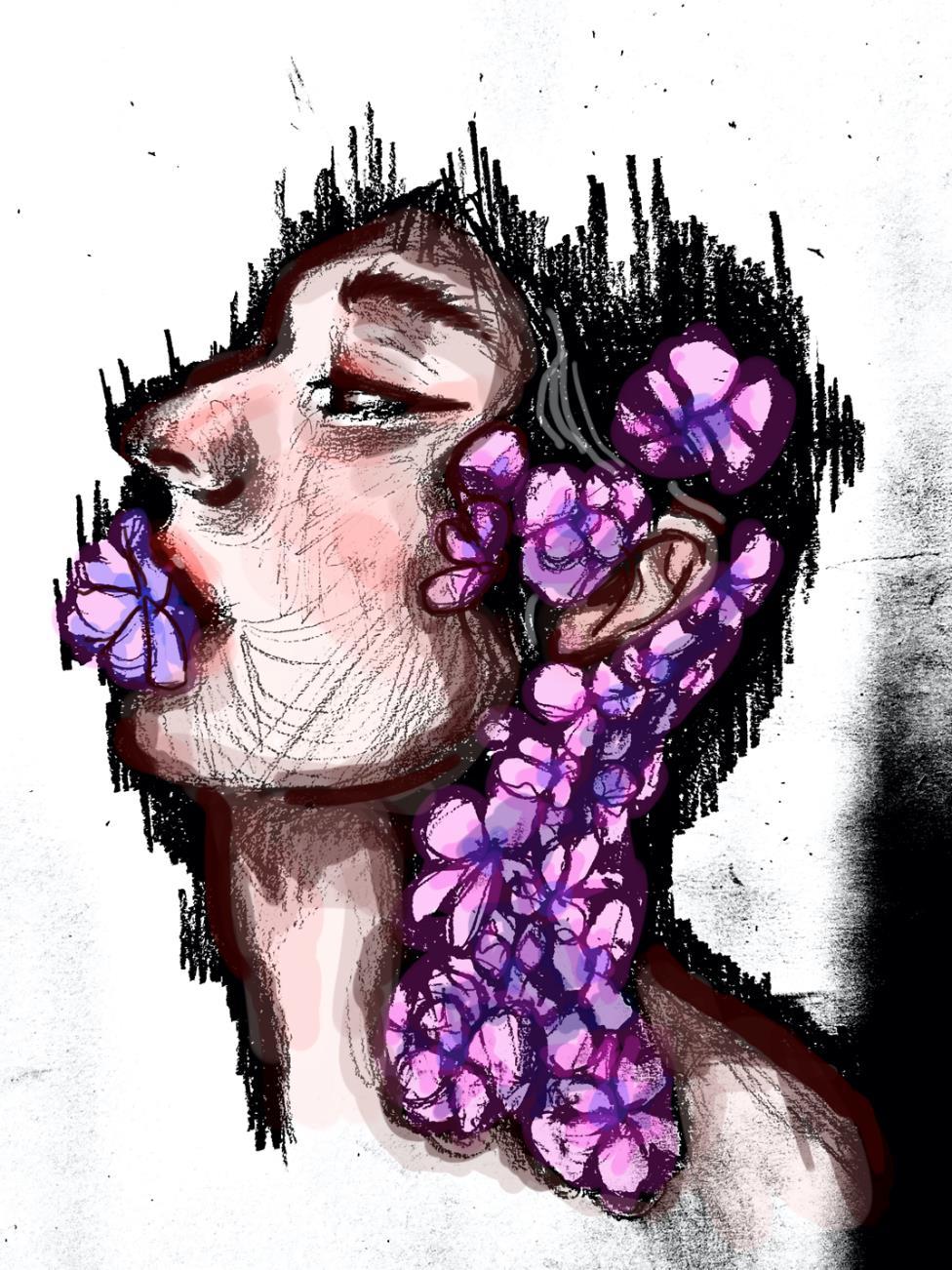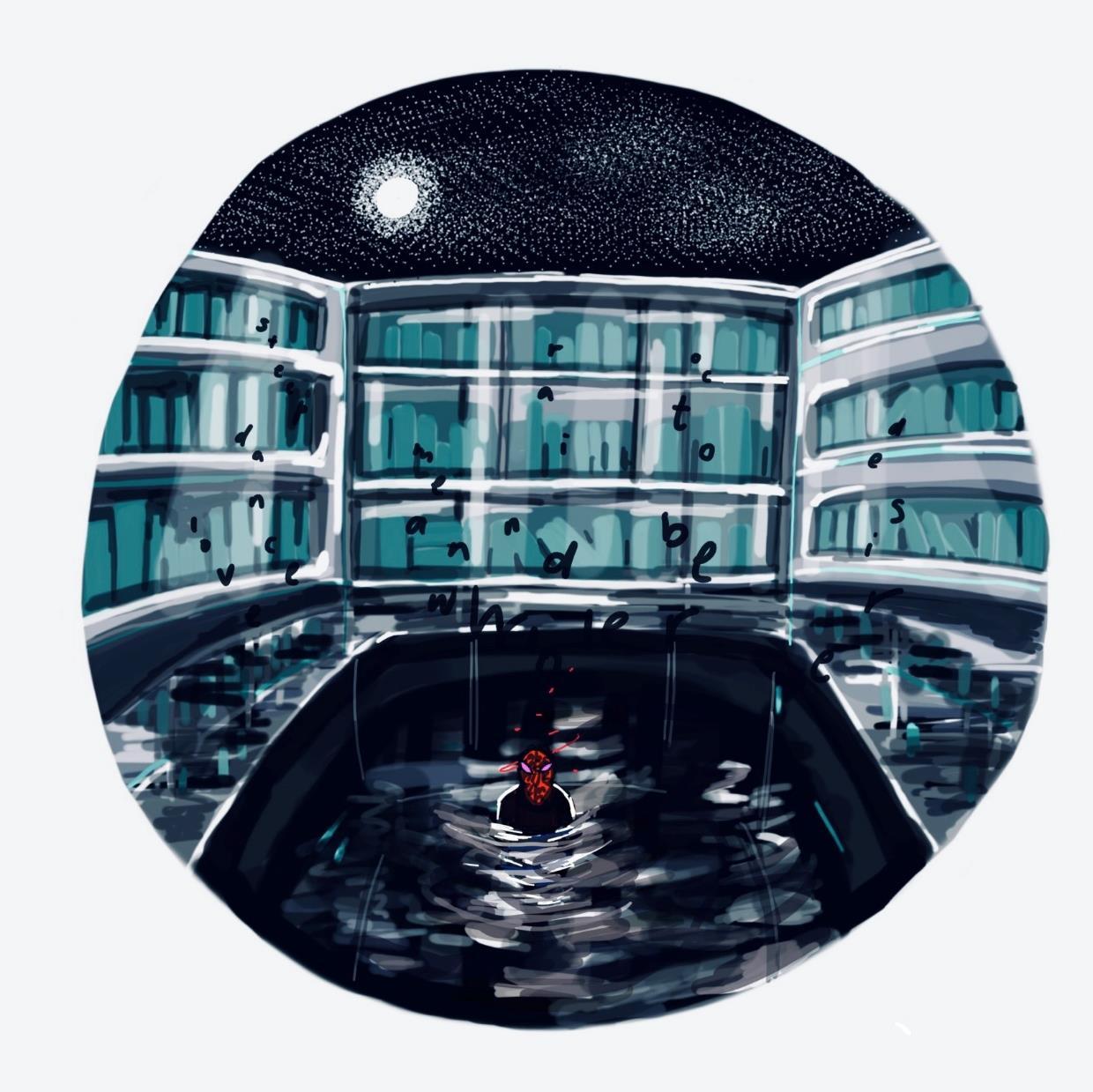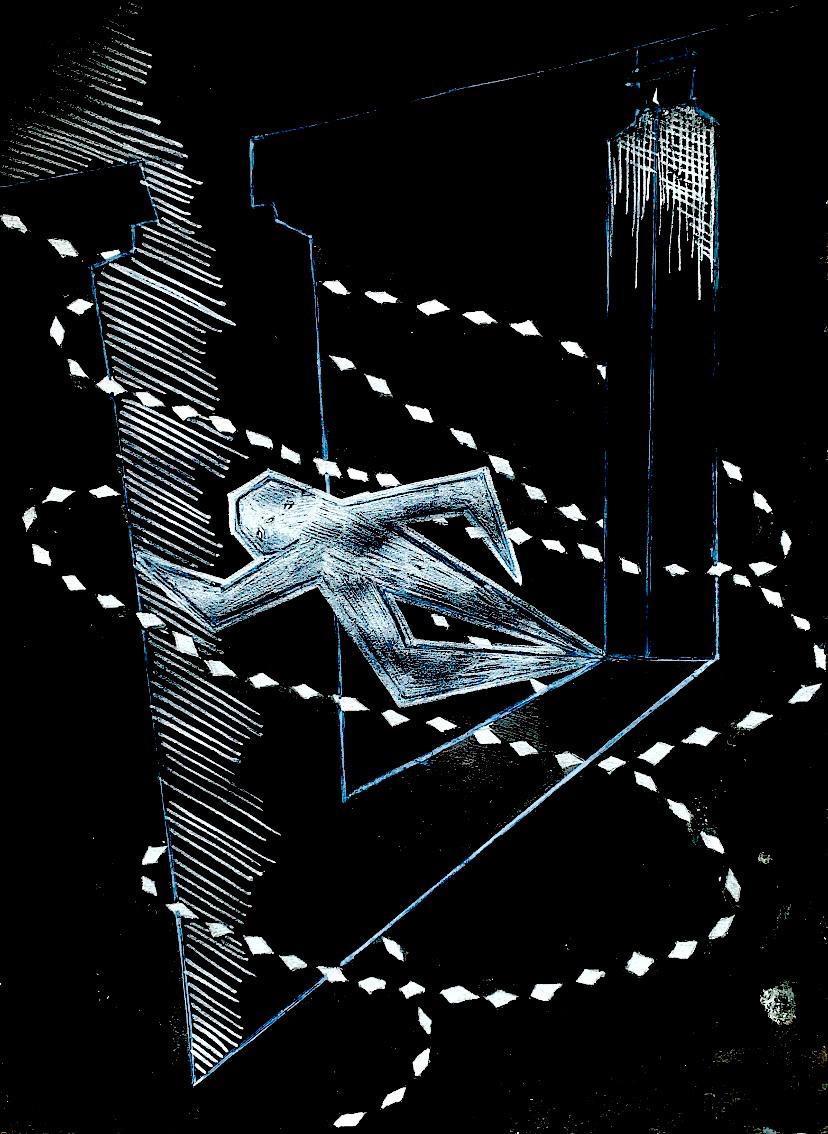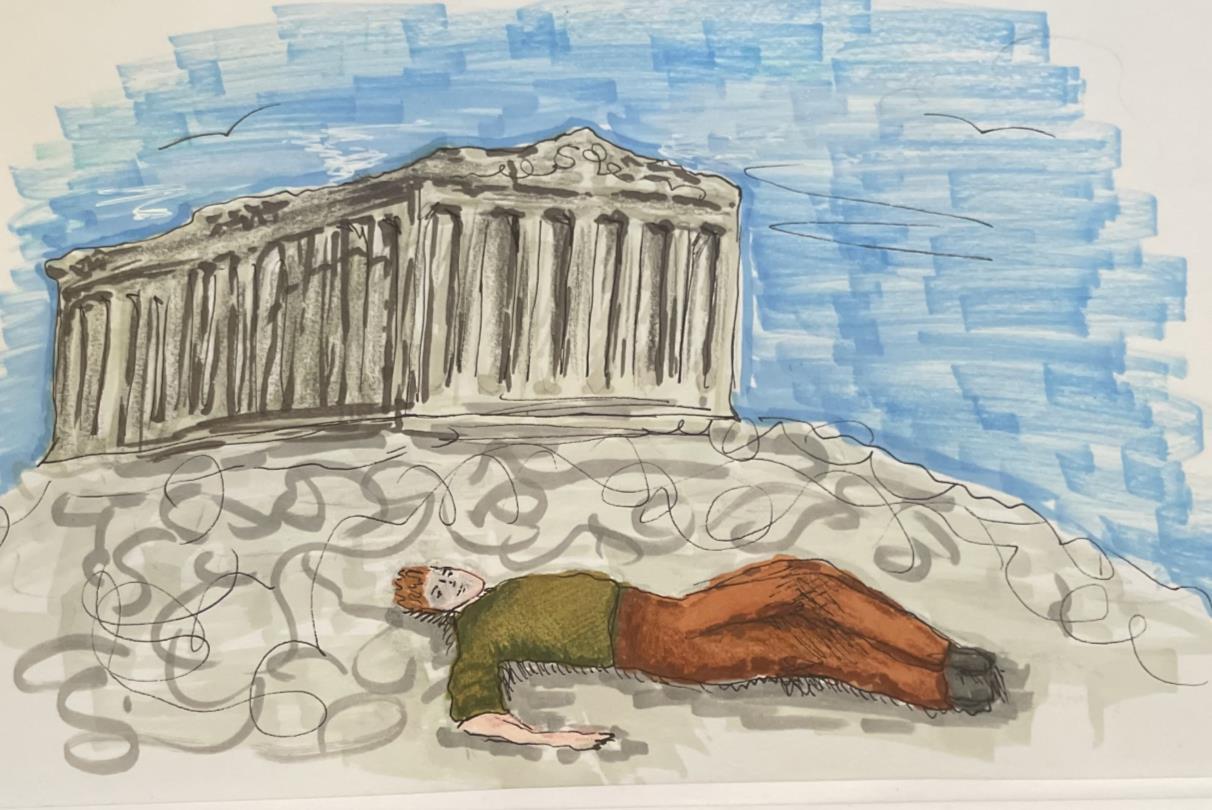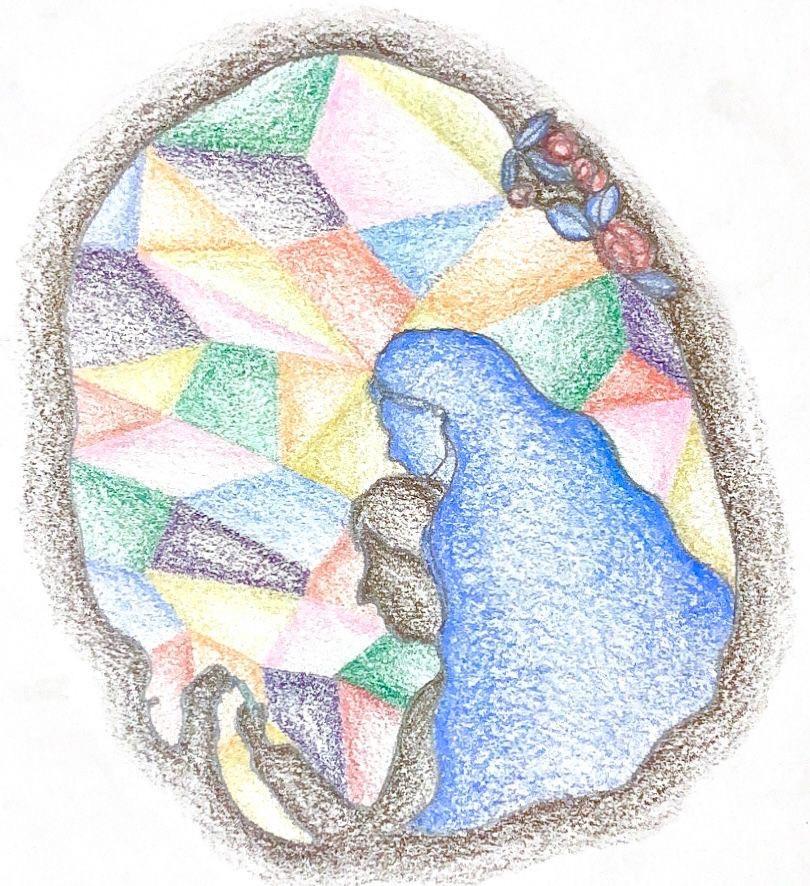A Glimpse of the Sun
I caught a glimpse of the sun
A ghost-like swathe of light
So late moon could’ve seen her,
Leaving a token of goodbye
I caught a glimpse of the sun
As she vanished into the trees
Glancing over her shoulder
A quiet smile at me
I caught a glimpse of the sun
She had a naked kind of beauty
A silver declaration in repose
Glowing secrets of transcendence
I caught a glimpse of the sun
I hardly recognised her
She wasn’t lazy and girlish
Blushing blonde over picnics and Daisy-braided hair
I caught a glimpse of the sun
She wasn’t allusive and fleeting
An afterthought over the shoulder
Disappearing through clouds, cruelty in neglect
I caught a glimpse of the sun
She wasn’t falling like woman divine
Pools of gold descent
A glittering shower of Greek passion
Forbidden and deified
I caught a glimpse of the sun
She was timeless in muted silver
An unseen mother, with loose hair
A disappearing nymph in the woods
I caught a glimpse of the sun
She was darker, had the closeness of the night
More real than at her summit, twirling blind
In central cosmos
I caught a glimpse of the sun
She was woman but felt no fear
Whispering firs, haunted white lace gloves
The smell of smoke at midnight
I caught a glimpse of the sun
She spoke in holy siren song
Fundamental discretion, magic subtlety
She carried stories of dead gods
I caught a glimpse of the sun
A spun wool embrace, a beckoning wind,
The dusting of flour that lingers
In the wake of baking bread
I caught a glimpse of the sun
As she left for other realms
It was dark and I wasn’t scared
That shared moment felt like home
Anonymous
Illustrated by Pippa Jones
Pomegranate
Her lashes are spiders, the pupil held within A doomed insect struggling in a contorting web
Her irises. Black, hollowed out shells.
The flesh conceals. It writhes, it feels.
It drips, dark and heavy as eternal slumber to rest
On a mound of earth. There it will die, Live and die again. Seeds bloom with every exhale
Like remnants of a fire, if ash and smoke could bleed.
Her mother’s body, bundled in night
Trembles with a fury almost enough to tear open
The gates of that world buried beneath the skies.
She roars and weeps though she doesn’t yet know
The bleeding fruit that will shackle her love
Is the very fruit her own hands had harvested.
AnnikaLi
Illustrated by Annika Li
The State of Poetry
You, the reader, are wrongly scared of death, So you trade the sound of silent truth for the Screams of a soul scourged by a leaden Snake’s tongue, for if your soul is not screaming, Your eyes are weeping.
You, the reader, believe that the water of life is collected in glass. You smother the fire and blood of apocalypse with white printed paper Lest anything persist, because persistence is not yours. This is your wrong choice.
You, the reader, are a lamb-hunter who cowers from lions. You break simple, good things. Harmony is rightly scared of you, It is proper for love to avoid your name, Joy justly hates your company, Peace finds refuge far from you, thank God. Rest strives to escape you, and that is right.
You, the reader, please Stop hunting lambs. Peace will never be achieved in your lifetime. Think about your trajectory, which is death. Your death should be evil. Please, make it evil.
AidenMasiero
Illustrated by Annika Li
Bedroom Walls
my bedroom walls are filled with teeth. they whisper, growl and slither. i’m on my elbows, on my knees the floorboards creak and wither.
the walls, they speak of dangerous things and monsters down below and tortured queens and fitful kings and feathers stripped of bone. the monsters hide from tomorrow and steal into my head. they tell me things i shouldn’t know then tuck me into bed.
like rusted keys and other Me’ s they wail and warp and shiver and emerging from the concrete: Eyes and lungs and heart and liver. They stretch their long, thin limbs around me Trace the edge of my chin They slide into the gaps between my fingers and my sin.
Then my head is full of teeth. My porcelain face cracks open And falls into their waiting arms, Eyes rolling into night. The shadows hum a lullaby And cradle shattered parts Of my broken face beneath my ceiling’s plastic stars.
the universe, it leaks and seeps bleeding through my bed. i lie fragmented, head in hands my mind left on the stairs.
my bedroom walls are filled with teeth until the sickly sun it steals in through my windowpane and makes me whole again.
AnnikaLi
Illustrated by Annika Li
The Voice
The jet slipped down onto the grass like a lizard. Sál heard a soft thud as the doors opened and she stepped out onto the ersatz grass. She squinted up at the sky as the crisp red jet sped away. She shivered, now she was alone.
‘At least the sky is clearer here. It must be the heat,’ She thought to herself. It certainly was hot. Synthetic smelling steam drifted up from the grass and away across the plain. She turned her eyes to her destination.
In the centre of the island was a mansion. It was surrounded by plastic looking topiary cut to perfection. Each one a perfect sphere. The mansion looked like a toy fresh from its packaging. The paint had the shine of newness, and the bricks were a brash red. The iron fence surrounding the mansion glinted in the afternoon light.
Pressing a button on the gate, she called out:
“Excuse me, please would you let me in. I’m Sál.” She waited expectantly, tapping her feet with a nervous ‘click click’ on the concrete path. Fear and relief mingled in her as she waited. She got no answer, but the gate swung open. She edged over to the door and turned the handle.
The entrance room was very spacious. There was a rack to hang your coat on by the door but other than that it resembled a kitchen. The house was very cold, but it felt soothing compared to the heat outside. There was an enormous expanse of marble in the centre of the room embellished with a bowl of fruit and a vase of purple peonies. Seeing the fruit reminded her of how hungry she was, she hadn’t eaten since she was told to come here yesterday. She slipped off her shoes and hung up her coat. Out of the corner of her eye she noticed a button on the wall. With shaky fingers she pressed it expecting it to be a light switch. Instead, she heard a low voice say,
“How can I help you Sál ?” Sál jumped backwards in astonishment but when the voice said nothing else, she edged closer to the button and said,
“I’m quite hungry, would you please tell me where I can find some food.”
“What sort of food are you craving?” the voice asked her softly.
“Something warm,” With her words she heard something on the island click. She spun around and to her disbelief a steaming bowl of purple liquid waited for her. She turned back towards the button and mumbled her thanks. There was a click and the voice was gone.
‘This isn’t too bad,’ Sál thought as she cautiously tasted the liquid.
After she had finished her ‘food’, she decided to search the wall for where the voice had come from. It had sounded so human she was convinced there was someone lurking behind it just out of sight but to her dismay she found out she truly was alone. At the very heart of the house, she found a room with glossy
obsidian floors. Surrounding the room were thick glass cases filled with floating beads that omitted a faint scent of violets. At the base of each case was an array of buttons. She pressed on one and with a zap one of the beads dropped to a removable panel below like a vending machine. She took it out and examined it closely sniffing it as she did. It looked like a black beetle in her hand, cold and shiny. It smelt of violets. She squeezed it and as she did it unfolded itself into a book made of light, so this was a library. After moving from case to case for a while she noticed a smooth grey box in one corner of the room. She tried to open it, but it had been sealed shut. With all the other intriguing cases in the room she soon forgot about it. Reading had always been a passion and a refuge for her. She had never been close with her sisters, and they had always teased her. They liked to joke about her name because of it’s unusualness. Her mother had seen the name in a ‘Scandinavian Holiday’ advert. Sál herself had only discovered the real meaning, ‘soul’ much later.
“Stupid Sál, Silly Sál, Sullen Sál” were some of her sisters’ favourite names to tease her with. She found that the best way to stay away from them was in the library, somewhere they would never go.
She spotted a tiny gold switch by the door and just as tentative as before, she pressed it. A languid voice called out, “Sál, how may I help you?” This time Sál eagerly leaned forward. “I would appreciate it if you would show me where to find my room.” There was a sharp click and one of the panels of the library sank down into the obsidian like wax. A lift was revealed, lined with fur. As she stepped inside the door slid shut and claustrophobia overwhelmed her as it glided upwards. She was in a bedroom. It had reflective lilac walls and beneath the glass floor she could see water like an aquarium. Electric blue and red fish scattered at her touch.
The next morning, she awoke consumed with hunger so was pleased to find a button in the wall by her bed. She pressed it and asked for some food. A horizontal panel appeared in the wall and a shelf jutted out of it lined with dishes. There were blue jellies and fluffy buns filled with saffron custard. She had an acid green drink that omitted pink bubbles. There was a platter covered in crystallised fruits that smelled of salted caramel. She tried a bit of everything spreading the dishes on the green marble bed. The only normal thing about the room was a bunch of peonies by the bedside which were also purple.
The following day Sál decided to explore the garden. However, she soon realised that this was not as exciting as it seemed and was in fact rather monotonous. The only things to be found were the strange round topiary, a few dusty shrubs and the rest resembled a fake grass desert. That night it was a relief to return to the coolness and entertainment of the house. She had even tried
swimming in the sea, but it was mostly too rocky or filled with strange slimy eels which had alarmingly orange eyes. She hadn’t spoken a word all day, except to criticise the eels, so she attempted a conversation with the voice:
“How did you find the gardens?” it asked her.
“Honestly, I was disappointed. Back home I swam in the sea every day and I was just hoping I would be able to do the same here. I suppose I just need to adapt,” she sighed.
“Have you seen the basement yet?” the voice questioned slowly.
“No… why what’s down there?” she probed.
“Why don’t you go and see for yourself tomorrow morning.”
“You’ve made me curious now. Maybe I will.”
On the fourth day, she noticed a fresh glass of peonies had been put by her bed. She decided to follow the voice’s advice and explore the basement. There was a small door next to the library which led downstairs, so with a torch in hand she descended. The basement turned out to be an enchanting place. There was a black, mirror-like pool to her pleasure, so she could swim after all. She slipped out of her clothes and into the water, gliding through the shining depths. She had lived on an island back home and often swam in the sea, while her sisters claimed the beach for sunbathing.
The days slipped by and became a blur of purple peonies and dips in the pool. Every night the voice asked her about her day in the same soft tone, until one night she sensed a reluctance in its voice.
“What is it?” Sál questioned it. The voice rarely hesitated. Sál took pleasure in its shyness or cautiousness because it reassured her that it was more than just a robot.
“I’ve been given some information…” it started slowly.
“Yes?” Sál encouraged.
“…Your sisters will arrive here tomorrow to see…” the voice paused again.
“To see if I’m still alive? Not that they care.”
“I’m sure that’s not true.”
“When I was about thirteen, I hit my head in a swimming accident and instead of carrying me to safety they abandoned me and told my parents I had drowned, so you’ll understand if I don’t entirely believe you.”
“That’s awful,” the voice murmured.
“Yeah, it was. Although coming here was terrifying, a part of me was glad that I’d escaped.”
The next morning, Sál began to ready herself for her sisters’ arrival, although the house was always miraculously tidy. She put on a black dress made of silk. Large bell-shaped sleeves seemed to drip from her arms like molasses and
delicate white roses with gold needling were scattered across the skirt. She had never worn anything quite so mesmerising.
Sál drifted aimlessly from room to room overcome with anxiety over the impending visit. At last noon approached (the time of their arrival). Sál sat herself on one of the stools in the kitchen as she waited. She called the voice to triple check that nothing could go wrong.
“How are you feeling?” the voice asked.
“I could feel better,” she laughed nervously.
“Well, I’m here if anything happens. But I doubt they will hurt you when you tell them about me, I can be scary if you want. Some good old fashioned slamming doors and flickering lights will put them in their place,” the voice joked.
“That would be great,” Sál smiled.
Knock. Knock.
Her sisters smiled expansively when they saw her, their eyes moving over her expensive clothes like ants.
“Sál darling how are you?” the elder of the two exclaimed pulling her into a hug, her hands clawing her back, “So, this is the dreaded monster’s lair. Well, it doesn’t look so menacing to me,” laughed Nora haughtily, squinting her eyes and scanning the room.
“You’re all alone here?” she asked in a mock sympathetic voice which had a bitingly taunting undertone.
“Not quite…” Sál began.
“What do you mean?” said Janey.
“There’s a sort of voice,” Sál explained, “If I press a button like this one over here, a voice does my bidding.” She pointed over to the switch on the wall.
“Oh, how lovely for you,” Nora cried flamboyantly, “Why don’t you give us a demonstration.”
“It’s about lunchtime so I’ll ask it to make us some lunch,” Sál considered.
“Go on then,” Janey encouraged. Sál went over to the switch and pressed it.
“How can I help you Sál ?” the voice asked.
“What would you like to eat?” Sál asked her sisters.
“Ooo I rather fancy some lobster,” Nora clapped delightedly,“Maybe some wine.”
“And Crème Brulé.”
After Sál ’s sisters had stuffed themselves as much as they could, they began to question, or rather demand, to know about her new life and in turn Sál asked them about life at home and gave them a tour of the house.
Her sisters lacked interest in the pleasures of the mansion but seemed much more intrigued by the voice. They questioned her as much as they could about
it. After a while Nora paused in her interrogation and sat back on the sofa pensively.
“Don’t you think it’s rather strange that you haven’t seen the voice’s source?” she asked, trying to pose as a concerned friend, “I mean, maybe it’s not the kind creature you think it is. It could be a monster, posing as kind, using what you’ve told it to manipulate you. If I was you, I would find a way of cracking open that box in the library.” Sál frowned and asked, “What box would that be?”
“Well, on the tour you gave us, I couldn’t help but notice a strange grey box in one corner of the library and since it is at the centre of the house, I suppose that would be the most natural place for ‘the voice’ to be concealed,” Nora explained, “If I were you, I’d want to know what was in there, that’s all.”
“I wouldn’t be able to resist the temptation myself,” piped in Janey encouragingly. Once again Sál smiled agreeably and changed the subject, but her sisters’ words couldn’t help but weigh on her mind.
Sál awoke in great spirits now that her sisters’ visit was out of the way. However, she soon felt a creeping sense of worry as she remembered her sisters’ warning. ‘I know the voice is kind and only has good intentions,’ she assured herself. But she couldn’t help her mind returning to what lay in the box by the stairs. She tried her best to distract herself, but despite all her efforts uncomfortable curiosity tickled her every thought. That night she did not sleep peacefully, she tossed and turned, going over again and again her sisters’ words: “Maybe it’s not the kind creature you think it is.” As she finally drifted off to sleep, she came to the decision: she was going to open the box.
The next morning, she went straight to the library. Using one of the kitchen utensils she prised open the box and felt herself blown backwards by a gust of wind and a bright white light. The library seemed to fold in on itself and she was in a black pool of warm water surrounded by the glass cases. From them she saw words spilling into the water like rain drops. Above all of this she saw a figure moving towards her across the water. The words surged up over the figure’s skin, swirling and gliding across their flesh in currents. Sál moved backwards against the edge of the pool. The figure was close now, so close that she could just make out a hint of purple in their eyes. Gently their hand caressed her face and as it did, she sank down into the water so that she was fully submerged.
Just as she began to struggle for breath, she felt her skin tingle as the water evaporated and she was lying on a large stretch of empty grass. The mansion was gone. What had she done? Was the voice only a construction of the library, an amalgam of words and nothing more? She lay back and stretched out her arms. As she did, she touched something. It was a small tin house, a perfect
miniature of the mansion. She desperately opened the box. Maybe it would bring back the mansion and her beloved voice. But all she found inside were dried peony petals. A breeze tossed them high into the air and as it did, she could have sworn they formed the word ‘Kärlek’. Love.
BeeBillett
Illustrated by Annika Li
Insomnia
There’s a famous dance song from 1995 called ‘Insomnia’ by the band Faithless, performed by Sister Bliss and Maxi Jazz. It has become a dance anthem, blasting in clubs and house parties. A boy downstairs who struggles with words calls it ‘insomina’. If I lie down at 10PM I’ll fall asleep at 1 AM and wake up 15 minutes later. I wake up in a cold sweat, desperate for a drink. Then, as I lie there, with sweat drying on my skin, a mundane choregraphed routine starts: duvet on, duvet off, pillow flipped, pillow flipped, no sleep for the next three hours, only a glimpse of a dream when I do. Repeat.
Next morning I miss breakfast, I miss a game, or I miss the phone. I can’t socialise and I don’t care that I’ve missed breakfast because I’ve lost my appetite. By the end of the day, I’m scared to talk to people, I’m happy talking to someone I don’t know, or someone who has to know me, like a teacher or someone’s parent. I can’t talk to my friends, like I think they don’t want to talk to me, even though chances are they do. I feel bitter sitting on the sofa, having not spoken to anyone, practically ran away, even though I’m sure someone specifically wanted to talk to me.
I’m just longing for the summer, when everyone’s apart from each other, so I’m no longer the black sheep. There are no events for me to miss, or people for me to ‘not see’. I can eat when I want, speak to the people I want and do what I want. Summer won’t cure my sleeplessness; it will only reduce my symptoms.
Until then, here I’ll lie, the dull buzzing of my desk fan gently tapping on by conscience, begging me to sleep but keeping me awake. And ‘insomnia’ throbbing through my numb skull.
Anonymous
"Watching," it whispered.
"He's watching." "Run."
"I SAID RUN!" RUN.
At first, it did not frighten me. Okay, it was odd, but not that odd for a fouryear-old, just a pretend friend. When it began, it was not unusual. Just a mere "Good morning, Ellie."
It never actually happened very frequently, but usually only when I was getting ready to do something major. Like when I performed the 8000 meters race when I was 16, it helped me through the whole thing.
Running was my getaway the whole time, my sanctuary from everything that distressed me. Especially the constant drama of my parents' divorce. My parents were the personification of hostility, could not tolerate each other, and my childhood was filled with a sense of impending anger and suspicion.
I found solace in running the serenity of rhythm, the exhilaration of the thud in my chest. It was my only escape, my way of forgetting the poison and the hate that churned in my lungs every moment I was trapped in that hellhole. The sound of my footsteps on concrete drowned out the din of their fights, the bitter cursing that echoed through our house.
I never thought it would pursue me even after I had left.
"Coming back," it spoke on one late March evening, its voice with a desperation I had never heard.
What?
"It's coming back" it continued "He's watching you."
In the 19 years this creature had been talking to me, it had never said anything like this. It was the first time it sounded scared. It sounded scared.
My mind spun back to the beginning, trying to piece together each of the cryptic messages it had delivered my way over the years. It began innocently enough. Small things like "Good luck, Ellie" before a big test or "Be careful" when the sidewalk was icy. It was comforting, like a guardian angel watching over my well-being.
But that was different now. That was a warning.
I couldn't help but consider who "he" could be. My mind darted to the people in my life my estranged father, a so-called friend turned foe, or someone I'd never even noticed. The possibilities were endless and terrifying.
I tried to ignore it but the longer it was stuck in my mind, the more the paranoia crept in. All the shadows seemed to elongate, all the groans of the house sounded like a footstep. I found myself glancing over my shoulder more than normal, darting glances at faces in crowds, searching for a pair of eyes that lingered a bit too long.
Sleep evaded me. I'd be in bed, looking at the ceiling, the only sound my breathing. From time to time, I'd hear it once more, a whisper in the blackness, "He's watching."
I started running more, not just the escape, but the chance that physical exhaustion would quiet the whispers, allow me some feeling of control. The soothing thump of my feet on the sidewalk was a momentary reprieve from the escalating terror.
But even while running, I sensed it. The sense of being watched. The feeling that I no longer owned my aloneness. Shadows observed me, shadows growing longer each day.
One evening, after an exhausting run, I collapsed on my bed, my body aching, my mind racing. I had to know. I had to know who "he" was and why he was following me.
"Who is he?" I exhaled into the blackness, hoping someone would respond, hoping for some sort of explanation.
I sat in stillness for a moment. Then, when I thought I was going to have to abandon hope, I heard the word again, a whisper really, "Soon."
The cryptic tone of the response merely heightened my concern. Weeks turned into weeks, and the feeling of being surveilled merely intensified. Rotating my shoulder with each fleeting moment, a chore, a requirement. This
individual, his visage never revealed, yet I was certain he was looking at me. Glaring, yet I could perceive no discontentment toward me, I sensed no ulterior motive. Naturally, this did not chase away any fear.
Desperation led me to my best friend, Sarah. She listened to me, her face a mixture of worry and incredulity.
"Ellie, maybe you're just stressed," she suggested hesitantly. "With everything you've been through, it's understandable to be paranoid."
But it wasn't stress. I knew that. I could feel it in my very bones.
There was this one night the whispers were louder, more frantic. "Run, Ellie. RUN!"
Tears dripping down my cheek from total mental exhaustion, I put on my shoes, the soles rubbed bare by years of running, and I emerged into the black night ahead of me. The blackness swirled around me, taunting me in this state. How dare they? I looked around. Nothing.
"I SAID RUN!"
I fell onto the ground. STOP, PLEASE.
I am pleading you" I cried, sobs now streaming down my face, I got up and started running.
The bite of the night wind cut into my face as I ran, the thudding beat of my feet striking the earth a soothing but embarrassing reminder of what I was doing. My gasps of breathing were strained, each exhalation a muttering prayer wishing this over with already. The voice in my head, the whisper grown brazen, now bellowed in relentless demand.
"RUN, ELLIE! FASTER, RUN!"
My legs burned with exertion, but I couldn't stop. I refused to stop. Shadows crept up beside me, black arms to snag at my ankles, to pull me back into the darkness of my fear. My mind was a whirlpool of fear and paranoia, every corner threatening something ominous.
I had to get out. I had to get away from him. The dark-coated man was a daytime fixture, a spectre haunting my steps. I saw him in shop windows reflected, at streetlamp light, never close enough to touch but always near enough to see. His face was always obscured, a faceless
terror that contributed to my growing hysteria.
"Stop, please," I shouted into the evening, my voice cracking. "Leave me alone!
"I can't, Ellie. I'm sorry," it had reverberated back to me.
But the voice in my head would not relent. "He is coming for you, Ellie. He won't stop until he has you. RUN!"
Tears blurred my vision as I pushed myself harder, my thoughts drifting back to my father. The hate, the fury that had infected my childhood, now seemingly physically in the form of this relentless tracker. Was it him? Had he come back for me, to reclaim me to the hell I once called home?
I didn't know anymore. I knew only that I had to run.
Suddenly, I felt a searing pain in my leg, a cramp that brought me to my knees. I clenched my thigh, trying to make the pain cease, but it grew worse. The whispers grew louder, more frantic.
"Get up, Ellie. You must run. He's on his way!"
But I couldn't change. My body refused to comply; my muscles trapped in agony. Panic surged through me as I looked around, the blackness enveloping me.
Help I managed, my lips unable to release with freezing fear.
And then I saw him. Dark-coated man standing at the edge of the park, face still hidden in the shadows. He was coming towards me, and my heart was pounding in my chest, a drumbeat of terror.
"RUN, ELLIE!" the voice in my head was screaming, but I was too paralyzed by fear and pain.
Why can't I move? Why won't my legs move?
ArchieClarke
Illustrated by Fumi St-Charles
Agent Arnold
The force of the explosion flung him to the ground. He lay there in the rubble, stunned, thinking he was dead. When it became apparent that he wasn’t, he very slowly sat up and looked around at the scene of carnage around him. As he tried to stand, his leg gave way beneath him. He sighed into the rubble. He had known this was a bad idea.
Arnold Brown, until a few months ago, had been an ordinary man; that is to say, he had a quiet job and lived in a quiet, semi-detached house next to quiet neighbours. However, one day he got to work and found a small, elderlylooking note on his desk. Looking around suspiciously, he opened it up and read the message that would change his life (again).
It said:
Arnold, we have a mission and we need your help. It’s dangerous, but you’re more than capable of handling it. Meet us at 5:00pm on Princes Street on Wednesday Eddie and Tim
Yes, although Arnold Brown may have seemed like an ordinary man to the untrained eye, he had had a past that was so eventful it would make your head reel, and it was no wonder he wanted a quiet life now.
You see, at the age of nineteen, Arnold had applied to MI6 to become a spy; fresh out of school with impressive grades, young Arnold was given the job. The next five years were the happiest and most exciting of his life. He was sent on countless missions around the world with his colleagues, Eddie and Tim, diffusing top-secret bombs, catching bad guys and saving the day, just like in a spy movie. However, at the age of twenty-four, while collecting information on some suspect activity in Lima, he rounded a corner without checking the coast was clear, and was shot in the leg. Luckily it wasn’t fatal, but he had to be sent back home immediately.
While recovering in hospital, he had time to ponder on what being a spy really meant to him. During those long, lonely days he realised how much danger he was in whenever he left home. When Arnold fully recovered, he travelled back to MI6 to hand in his notice. Although it was painful, he was ready for a change. He’d had enough excitement for a lifetime.
But now, as he looked at that tantalising – albeit slightly self-destructing - note in his hand, he was reminded of what a great time he’d had, living that life. Yes, it was risky, but that was all part of the fun! So, at quarter to five on Wednesday, Arnold Brown could be seen walking in the direction of Princes Street with the face of a man who was thoroughly in two minds.
The next few days went by in a flash and almost before he knew it, Arnold found himself on a plane to Greece in between Eddie and Tim to search for bombs in the area of Athens after a tip off. Gosh, he had missed this: the smell of the grainy paper within the covert files mingling with the rough, strong aroma of the GOVERNMENT OFFICIAL stamp, the banter between him and the boys, the thrill of knowing you’re walking into the face of danger and openly defying it.
A day later, the trio was walking to the suspected bomb site, but they had been overconfident and careless and, almost inevitably… Arnold found himself lying face down in the blackened grass, a numb pain calling from his (formerly unbroken) leg. Not again!
Illustrated by Pippa Jones
PippaJones
The Stories that We Tell Ourselves
The wrinkles have long since begun to settle into the old man’s skin like the rain in soil, and the eyes, rheumy with cataract are pallid and hopeless in their milky drift. He is as much a part of the furniture as the chairs and chez long and he supposes that after he is gone, he will remain, only slightly blurred in colour, as ghosts often are, belonging to, never ceasing to leave. He has created so many. Drawn them out in brown ink from the tip of a fountain pen in words that obsessively scrawl the adventures he once wanted to live. Now these phantoms speak wistfully into his ears, as if they have risen from the page he wrote them down on and now weave into one metaphysical spectral dance around the furniture from where he sits. Perhaps the waltz. Simple but elegant. Or maybe just a slow dance, intimate between two. A favourite of his wifes’. Years ago, he might have put on Bernstein’s ‘Adagio for Strings’ and let her head rest on the crook of his neck, and sway gently when the party guests had all dispersed and the sweet taste of drinks had left whiskey kisses on each other’s mouths. They would tenderly hold each other’s hands, the way that lovers do, and she might tell him that they would tidy up tomorrow, drowsy and slurring their words.
He puts the pen down briefly to put that record on. How old he’s become, he thinks, that he finds he cannot dance by himself. And so, he does, smiling softly as the ghosts he has written creak around his joints. One ghost has not shown her head. Indeed, he has not written that ghost at all. She lies in the aching vessels of his tired heart, where an old man has hidden his fear of grief down with the other memories of her laugh, and the smile lines around her eyes. How much he would like to feel her skin soft against his cheek and dance slowly to old music, the simple antiquities of dusty life laid to rest before each other. Honest and true.
He has searched day after day for a meaning to it all and so he writes, as he is writing this now. His fingers shake. They have done for 20 long years since the accident. Too soon. The thing about accidents is that you cannot control them. In many ways he believes the same about life. There is razor thin chance of life on earth and here we are. But with the immovable accident of life comes the tragic promise of death. An accident to live yet doomed to die. Irony he supposes. Doomed to lose those around you. But perhaps there is something glittering in the coal sodden miseries of this circle of life. Perhaps our beauty, he thinks, is that one day we willdie. And that the pain of losing is simply the knowledge that you have loved. Everything seems so much brighter when you know there will be a day when you won’t be around anymore. Perhaps that’s why we love. The gods, consumed with hate, vile immortal pettiness for one another, never will know what it is to lose. That mortality brings its swinging gates shut and leaves you outside. And that is why we stay.
To hold tightly the ones, we know we will have to say goodbye to someday, and the world becomes a happier place for as long as we can make it so. The old man sinks into his chair again. Too many thoughts for a brain that has lived as long as it has, he laughs. Too philosophical for the moments, he’s got left. His hands shake again as he picks up the pen. He was reminded of a day when he was much younger. Barely nine years old perhaps, where the notions of life are somewhat dizzy and trying to recall it feels like a fever dream. The beach was warm with hot sands and the spray of sea burnt on young skin. The same skin as he sits in now, just reupholstered on older limbs and regrown over scars that happened much later. His hands which didn’t shake then, were still and resolute like the soldiers he had seen his father march off with to fight some other senseless war, among the poets and the preachers who all alike would die on poppy fields, still dying now. But he didn’t know that yet and he clasped his fingers tightly into a makeshift bowl to hold the sea, in his little boy hands. And yet as hard as he forced his fingers together, he couldn’t make the water remain. The little tidal pools he created in his palms never held the water for long, and it would sink out back into the sand below his feet. He remembered feeling confused. Why would his hands not work? These useless hands. He had tucked them under his legs and glared up at the sun, cursing the creator that made his hands the way they were. But those useless hands hadn’t yet written the ghosts that sit behind him urging to hear the rest of this memory. These hands hadn’t yet combed through messy hair and made breakfast every day for as long as he can remember. These hands that seem to fail him now are the same that picked the water in cups from the sea, in the hopes it might appear as blue as the whole ocean does from the stars. Oh, these hands have wiped away so many tears. And though he does not like to admit it now, because the pain of the accident is too much to bring up casually, these were the same hands that gripped the wheel tightly until one let go to protect the passenger. Too late. These hands now shake because of it. If she were here beside him now, she might trace the creased and folded fingers and skin that runs along his veins and hold this tremor still like a god silencing an earthquake. She would pull roots from out his dying skin and let the peace of trees and flowers eat away at the survivor’s guilt that sits heavy on his chest each day. And oh, to see his love again. To look up at the stars and instead of seeing his lover’s face amongst them, see her beside him, and trace the potential along Orion’s belt and the big dipper. He might have lived a thousand years beside her. But all good things must come to an end. Their beauty is their ephemerality not their immortality. So he will put away the music and the slow dances, the laughs and the whiskey kisses in letters that he won’t send, and hope, that long after he is gone, the paper upon which he has written what he cannot say, will rot into the soil which he makes of his tears, and ripen into bloom a lady bird’s fortress of stunning wildflower, where all his ideas decay into the matter of which it arose, rich in that superfluous
opulence of nature. He is tired now. He misses being a boy, and being carried to bed by his mother who strokes his eyelids and whispers till he falls softly to sleep. He misses his wife. He wants to tell her how her roses bloomed the winter of her passing, and how they still do, miraculously, every winter, like their seasons have switched since she’s been gone. He wants to tell her how he will let her in. He will uncork the holes in his lungs. He will let her fill them up with air. Even if that means opening the covers in the bed of his mouth to let her sleep beside him. He will peal back the plasters and the gauze that he mummifies himself in. He will wrap them around her too. She can filter her tea with kisses even if that means plying away the pain of clenching his teeth too tightly. Even if by morning, his mouth hangs open with words that had slipped beneath his tongue. And if she would call, drowning herself with the sweat of the longest day, he would shut his ears to all but her voice. Even when the wind splutters and the line breaks and her words become tired, he would open himself up to all the imperfections that surround her, that surround him too.
Deep in the troughs of her mood, her head in her hands, fingers grasping at hair as if to try and count each strand. Where does he sit between her temples, the timeline that we all create from our lives, each unlived year, a question mark that shifts beneath her gaze. She said such cruel things when she was tired. She let the darkness under her eyes fill her words and she might watch closely to see if they needled into his sensitive skin. They often did, and he would pick them out looking down to where beads of blood soak through his clothes, injected through the fine cotton of the only armor he had on. He let it fall at the door of their bedroom, vulnerable to each syllable she let crisply out her mouth. They were only human, and he loved her for all the words she had to say, the kindest but the cruelest too. He let the day in while she would focus on the thickness of the dark. She let it rest on her shoulders and by morning she would be bent double with the night, and he would curse the slings and arrows of their outrageous fortune, but they could not separate themselves from fate. Their love was full of bitterness, and it bites him just remembering. It tracks circles round his mind, it forfeits a good day for a moment of tears. Troubled love, human love. He wants to regress down to his smallest self in her arms again, letting themselves whisper the night away in hushed tones like they were young again knowing nothing there was to know about loss.
And after he has finished this sentence, he will get up from his chair and place down his pen in its resting spot in the pen holder. He will close the blinds and shut the windows and organise his papers into piles of thought. He will blow out the candles and shift the sofas and chairs and dust the chez long. He might think back on his life, on his beautiful existence, so short lived yet in its infinite ways it will continue. His legacy of stories will write themselves into shipwrecks
and the log fire will crackle in the grate till the embers die. He will pull the sheets over himself one last time and slip away into a doze, a warm and inviting sleep, tender like his lover’s arms, where he will fall one last time into the embrace of his wife. He will forever lie in peaceful soil, like the wrinkles that lined his face with natural age, beside his wife in orchards of fallen fruit and wildflowers where his stories feed the earth. Where the winter blizzard won’t tangle his hair and rip her away again. There you will find them, entangled in arms, two lost lovers, age becoming both of them, one another, their wrinkles, and the texture of their skin that has held so much, now becomes the sleepy maps of human tissue and there they will form the stories that we tell ourselves now. Material returned to the fundamental nature of existence. Love returning to love. For that’s all we have in the end. The circle of what we gave returns to ourselves. Hate to hate. Generosity to generosity. Peace to peace. And love to love.
EllieHenderson
Illustrated by Fumi St-Charles
Sceptical
The small Town’s Hero lay dead and buried in the packed graveyard of the church that acted as the town hall on weekdays. Flowers were often placed beneath the headstone and few words uttered. His headstone said, ‘Hero and Warrior, Died Fighting 1952’, most other headstones said loved brother/sister or father or husband. His didn’t.
He arrived in the town in the early December of 1945 and stayed in the inn where non-locals rarely saw a drop of alcohol due to an old barman who claimed to simply be ‘loyal’ to his regulars, how the Hero came to find lodging in that inn, is hard to say.
On that Christmas day, he could be seen in the same inn, muttering an incoherent drunkard’s jargon. The bar closed early, and so he combed the street until he found a bench on the side of the road to sit on.
He later found lodging in a single bedroom flat above the only butchers’ shop in town. In the summer, he could be seen roaming and weaving between the stones in the church graveyard, he would read the names of each man, woman and child and pause. At certain graves, after reading what was written, he would take out a flask, give what looked like a toast and take a swig of whatever he had. This ritual repeated itself every year, and each year, as the stones became more decrepit, they gained more of a likeness to the person whose name they held. More toasts were always made around September. As the years passed, the ‘Hero’ would continue his rituals, just slower and slower still. In the December of 1951, around when he had first arrived six years earlier, he stopped emerging from his room above the butchers. The fog of December made the town quieter still. The Hero would cough for hours on end without relent, the noises sounded like barks ringing through the street. In January he died and by early February he was buried in the same graveyard that he had trodden through on many an occasion beforehand. An old vicar who’d been posted in the town soon after the Hero’s arrival, stood before his tombstone and read the inscription, his eight half-tame dogs were all sat or sniffing nearby. The vicar (who had never seen the man step foot into the church despite his frequent visitations to the graves that dotted surrounding area) made the sign of the crucifix across his chest and turned away from the young tombstone. As he walked off, he muttered: ‘some hero’, he drank again ‘some hero’s death’.
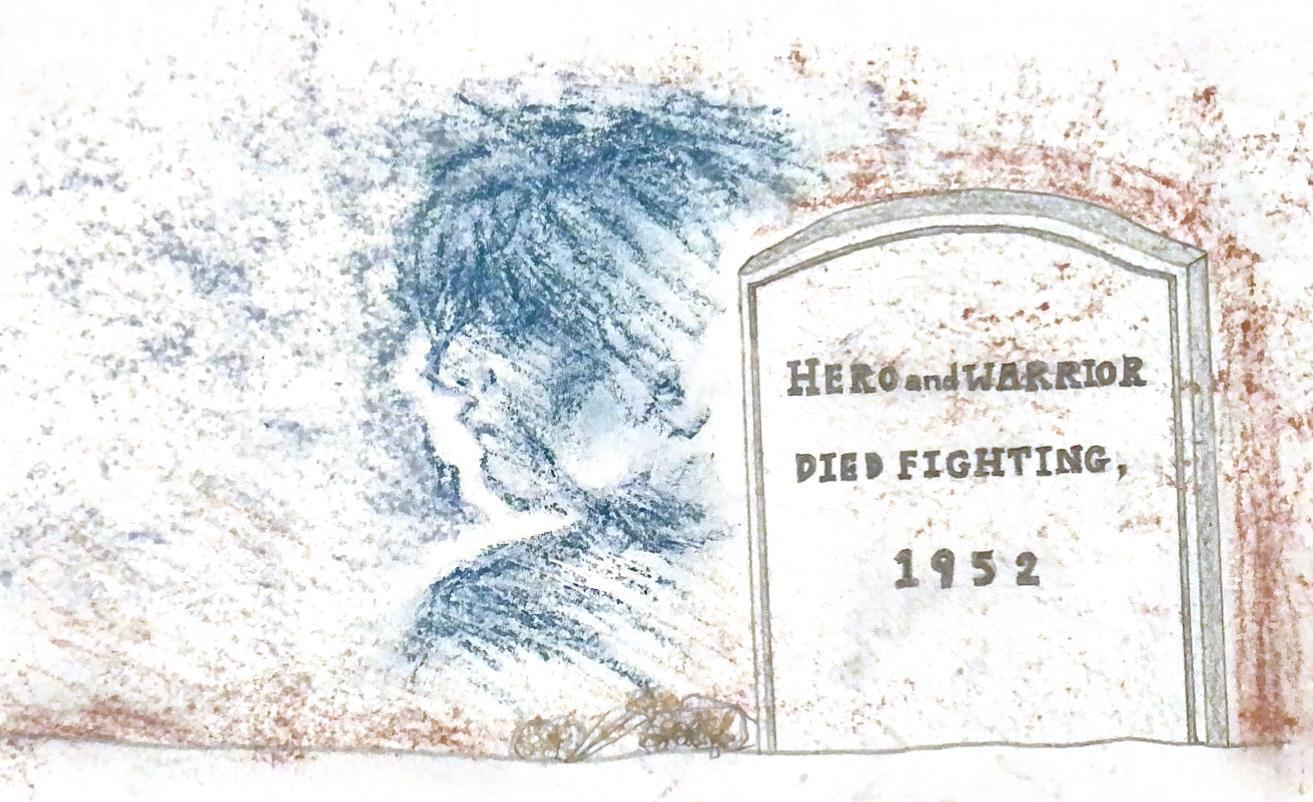
Illustrated by Fumi St-Charles

